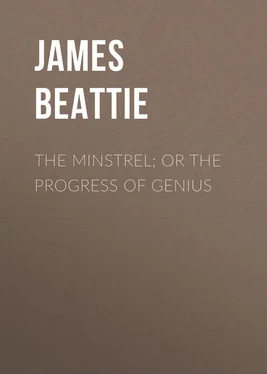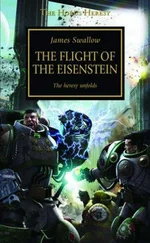James Beattie - The Minstrel; or the Progress of Genius
Здесь есть возможность читать онлайн «James Beattie - The Minstrel; or the Progress of Genius» — ознакомительный отрывок электронной книги совершенно бесплатно, а после прочтения отрывка купить полную версию. В некоторых случаях можно слушать аудио, скачать через торрент в формате fb2 и присутствует краткое содержание. ISBN: , Жанр: foreign_antique, foreign_prose, foreign_poetry, на английском языке. Описание произведения, (предисловие) а так же отзывы посетителей доступны на портале библиотеки ЛибКат.
- Название:The Minstrel; or the Progress of Genius
- Автор:
- Жанр:
- Год:неизвестен
- ISBN:http://www.gutenberg.org/ebooks/27221
- Рейтинг книги:5 / 5. Голосов: 1
-
Избранное:Добавить в избранное
- Отзывы:
-
Ваша оценка:
- 100
- 1
- 2
- 3
- 4
- 5
The Minstrel; or the Progress of Genius: краткое содержание, описание и аннотация
Предлагаем к чтению аннотацию, описание, краткое содержание или предисловие (зависит от того, что написал сам автор книги «The Minstrel; or the Progress of Genius»). Если вы не нашли необходимую информацию о книге — напишите в комментариях, мы постараемся отыскать её.
The Minstrel; or the Progress of Genius — читать онлайн ознакомительный отрывок
Ниже представлен текст книги, разбитый по страницам. Система сохранения места последней прочитанной страницы, позволяет с удобством читать онлайн бесплатно книгу «The Minstrel; or the Progress of Genius», без необходимости каждый раз заново искать на чём Вы остановились. Поставьте закладку, и сможете в любой момент перейти на страницу, на которой закончили чтение.
Интервал:
Закладка:
The Minstrel; or the Progress of Genius / with some other poems
PREFACE TO THE MINSTREL
The design was, to trace the progress of a Poetical Genius, born in a rude age, from the first dawning of fancy and reason, till that period at which he may be supposed capable of appearing in the world as a Minstrel, that is, as an itinerant Poet and Musician; – a character, which, according to the notions of our fore-fathers, was not only respectable, but sacred.
I have endeavoured to imitate Spenser in the measure of his verse, and in the harmony, simplicity, and variety, of his composition. Antique expressions I have avoided; admitting, however, some old words, where they seemed to suit the subject; but I hope none will be found that are now obsolete, or in any degree unintelligible to a reader of English poetry.
To those, who may be disposed to ask, what could induce me to write in so difficult a measure, I can only answer, that it pleases my ear, and seems, from its Gothic structure and original, to bear some relation to the subject and spirit of the Poem. It admits both of simplicity and magnificence of sound and of language, beyond any other stanza that I am acquainted with. It allows the sententiousness of the couplet, as well as the more complex modulation of blank verse. What some critics have remarked, of its uniformity growing at last tiresome to the ear, will be found to hold true, only when the poetry is faulty in other respects.
THE MINSTREL; IN TWO BOOKS
Me vero primum dulces ante omnia Musæ,
Quarum sacra fero, ingenti perculsus amore,
Accipiant. —
THE MINSTREL; OR, THE PROGRESS OF GENIUS.
BOOK FIRST
Ah! who can tell how hard it is to climb
The steep, where Fame’s proud temple shines afar!
Ah! who can tell how many a soul sublime
Has felt the influence of malignant star,
And waged with Fortune an eternal war!
Checked by the scoff of Pride, by Envy’s frown,
And Poverty’s unconquerable bar,
In life’s low vale remote has pined alone,
Then dropt into the grave, unpitied and unknown!
And yet, the languor of inglorious days
Not equally oppressive is to all.
Him, who ne’er listened to the voice of praise,
The silence of neglect can ne’er appal.
There are, who, deaf to mad Ambition’s call,
Would shrink to hear th’ obstreperous trump of Fame;
Supremely blest, if to their portion fall
Health, competence, and peace. Nor higher aim
Had He, whose simple tale these artless lines proclaim.
This sapient age disclaims all classic lore;
Else I should here, in cunning phrase, display,
How forth The Minstrel fared in days of yore,
Right glad of heart, though homely in array;
His waving locks and beard all hoary grey:
And, from his bending shoulder, decent hung
His harp, the sole companion of his way,
Which to the whistling wind responsive rung:
And ever as he went some merry lay he sung.
Fret not yourselves, ye silken sons of pride,
That a poor Wanderer should inspire my strain.
The Muses fortune’s fickle smile deride,
Nor ever bow the knee in Mammon’s fane;
For their delights are with the village-train,
Whom Nature’s laws engage, and Nature’s charms:
They hate the sensual, and scorn the vain;
The parasite their influence never warms,
Nor him whose sordid soul the love of wealth alarms.
Though richest hues the peacock’s plumes adorn,
Yet horror screams from his discordant throat.
Rise, sons of harmony, and hail the morn,
While warbling larks on russet pinions float;
Or seek, at noon, the woodland scene remote,
Where the grey linnets carol from the hill.
O let them ne’er, with artificial note,
To please a tyrant, strain the little bill!
But sing what heaven inspires, and wander where they will.
Liberal, not lavish, is kind Nature’s hand;
Nor was perfection made for man below.
Yet all her schemes with nicest art are planned,
Good counteracting ill, and gladness woe.
With gold and gems if Chilian mountains glow,
If bleak and barren Scotia’s hills arise;
There, plague and poison, lust and rapine grow;
Here, peaceful are the vales, and pure the skies,
And freedom fires the soul, and sparkles in the eyes.
Then grieve not, thou, to whom the indulgent Muse
Vouchsafes a portion of celestial fire;
Nor blame the partial fates, if they refuse
The imperial banquet, and the rich attire.
Know thine own worth, and reverence the lyre.
Wilt thou debase the heart which God refined?
No; let thy heaven-taught soul to heaven aspire,
To fancy, freedom, harmony, resigned;
Ambition’s grovelling crew for ever left behind.
Canst thou forego the pure ethereal soul
In each fine sense so exquisitely keen,
On the dull couch of Luxury to loll,
Stung with disease, and stupified with spleen;
Fain to implore the aid of Flattery’s screen,
Even from thyself thy loathsome heart to hide,
(The mansion, then, no more of joy serene)
Where fear, distrust, malevolence, abide,
And impotent desire, and disappointed pride?
O, how canst thou renounce the boundless store
Of charms which Nature to her votary yields!
The warbling woodland, the resounding shore,
The pomp of groves, and garniture of fields;
All that the genial ray of morning gilds,
And all that echoes to the song of even,
All that the mountain’s sheltering bosom shields,
And all the dread magnificence of heaven,
O how canst thou renounce, and hope to be forgiven!
These charms shall work thy soul’s eternal health,
And love, and gentleness, and joy, impart.
But these thou must renounce, if lust of wealth
E’er win its way to thy corrupted heart;
For ah! it poisons like a scorpion’s dart;
Prompting the ungenerous wish, the selfish scheme,
The stern resolve, unmoved by pity’s smart,
The troublous day, and long distressful dream.
Return, my roving Muse! resume thy purposed theme.
There lived, in Gothic days, as legends tell,
A shepherd-swain, a man of low degree;
Whose sires, perchance, in Fairyland might dwell,
Sicilian groves, or vales of Arcady;
But he, I ween, was of the North Countrie:
A nation famed for song, and beauty’s charms;
Zealous, yet modest; innocent, though free;
Patient of toil; serene amidst alarms;
Inflexible in faith; invincible in arms.
The shepherd-swain, of whom I mention made,
On Scotia’s mountains fed his little flock;
The sickle, scythe, or plough, he never swayed;
An honest heart was almost all his stock;
His drink the living water from the rock:
The milky dams supplied his board, and lent
Their kindly fleece to baffle winter’s shock;
And he, though oft with dust and sweat besprent,
Did guide and guard their wanderings, wheresoe’er they went.
From labour health, from health contentment springs.
Contentment opes the source of every joy.
He envied not, he never thought of kings;
Nor from those appetites sustained annoy,
Which chance may frustrate, or indulgence cloy:
Nor fate his calm and humble hopes beguiled;
He mourned no recreant friend, nor mistress coy,
For on his vows the blameless Phœbe smiled,
And her alone he loved, and loved her from a child.
Интервал:
Закладка:
Похожие книги на «The Minstrel; or the Progress of Genius»
Представляем Вашему вниманию похожие книги на «The Minstrel; or the Progress of Genius» списком для выбора. Мы отобрали схожую по названию и смыслу литературу в надежде предоставить читателям больше вариантов отыскать новые, интересные, ещё непрочитанные произведения.
Обсуждение, отзывы о книге «The Minstrel; or the Progress of Genius» и просто собственные мнения читателей. Оставьте ваши комментарии, напишите, что Вы думаете о произведении, его смысле или главных героях. Укажите что конкретно понравилось, а что нет, и почему Вы так считаете.












